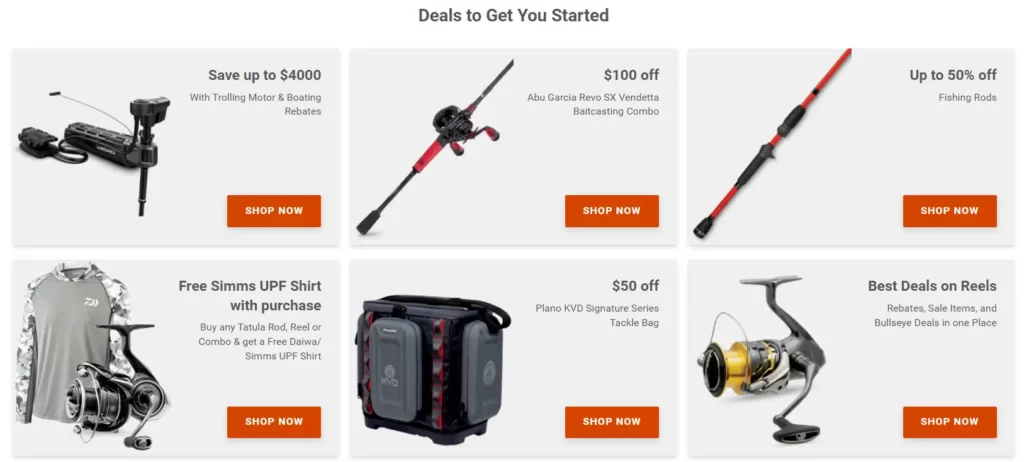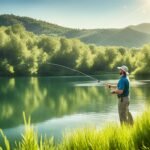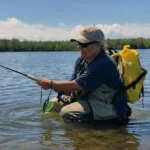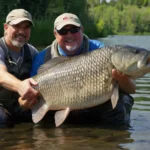Explore Canada's Ultimate Fishing, Hunting, and Wildlife Adventures
Common Mistakes Beginners Make: Essential Tips for Successful Fishing

Ready to cast your line in remote waters?
It’s thrilling, but watch out for beginner pitfalls. These can turn your dream trip into a frustrating experience. Let’s explore common mistakes and how to avoid them.
We’ll uncover prevalent Common Mistakes Beginners Make and provide Beginner Tips for a great fishing trip. Our insights will help you sidestep Rookie Errors and Novice Pitfalls.
Learn to avoid Learner Missteps and Newbie Blunders. You’ll become a confident, well-prepared angler ready for adventure.
Key Takeaways about Common Mistakes Beginners Make in Fishing
- Thoroughly research your fishing destination to avoid costly mistakes
- Carefully pack the right gear to ensure a comfortable and productive trip
- Understand the local weather patterns to be prepared for changing conditions
- Prioritize safety and comfort by booking a reputable lodge and guide
- Manage your expectations and focus on enjoying the overall fishing experience
Not Researching the Fishing Destination
Researching your fly fishing destination is crucial. Each location has unique fish species, water conditions, and weather patterns. Knowing these details helps you prepare and choose the right gear.
Researching Tips
Consider these tips for a rewarding fly fishing experience:
- Check online forums and reviews from experienced anglers. They offer insights into local fish species, preferred lures, and unique challenges.
- Contact local fishing guides or experts. They provide knowledge about best spots, seasonal patterns, and recommended gear.
- Study maps and satellite images of the fishing area. This helps plan your strategy and identify potential hotspots.
Thorough research increases your chances of a successful trip. It allows you to make informed decisions about equipment and techniques.
Proper preparation maximizes your time on the water. You’ll be ready to adapt to unique challenges and opportunities.
“Fly fishing is not just about catching fish; it’s about immersing yourself in the natural beauty of the environment and connecting with the local culture and wildlife. Doing your research will help you make the most of this experience.”
A well-informed mindset is key to a rewarding fly fishing trip. Taking time to research ensures a memorable and successful adventure.
Packing Errors: Overpacking or Underpacking Gear
Fishing trips need a careful balance of essential gear. Beginners often struggle with this balance. Common packing errors can ruin the fun of your fishing adventure.
Overpacking is a frequent mistake. Novices may bring too much gear, making movement difficult. This can lead to exhaustion and limit exploration.
Disclosure: When you purchase a service or a product through our links, we sometimes earn a commission, at no extra cost to you.
Underpacking can be just as troublesome. Forgetting Fly Fishing Essentials like a versatile rod or proper flies is problematic. It can cause frustration and missed chances.
To pack right, think about what you really need. Consider versatile, multi-purpose items for your Fishing Gear Packing. Don’t forget suitable clothing and rain gear.
Fly to Your Canadian Fishing Paradise
Book cheap flights to Canada's best fishing spots!
One search, all flights
Find the best deals to your favorite fishing spots
Kiwi.com Guarantee
Travel worry-free with our protection
Trusted by millions
Join anglers booking cheap flights with ease
Disclosure: When you purchase a service or a product through our links, we sometimes earn a commission, at no extra cost to you.
Successful Fishing Trip Packing List balances essentials and convenience. Avoid extremes in packing. This lets you focus on the joy of fishing.
Ignoring Weather Patterns and Conditions

Fly-in fishing trips can be incredibly rewarding, but they require careful planning. Weather plays a crucial role in the fishing experience. Ignoring it can lead to unpleasant surprises and potentially ruin the trip.
To ensure a successful adventure, keep a close eye on Fishing Weather Preparation. Regularly check forecasts and understand Seasonal Weather Patterns at your destination. Weather changes can affect fish behavior, accessibility, and your comfort on the water.
For Fly Fishing Weather Considerations, packing the right gear is vital. Bring layered clothing for temperature changes. Include waterproof gear to stay dry in case of sudden rainstorms.
| Weather Factor | Potential Impact | Preparation Tips |
|---|---|---|
| Temperature Changes | Affect fish activity and feeding patterns | Pack layers, including thermal underwear, fleece, and rain/windproof outer layers |
| Precipitation | Reduce visibility, make it challenging to cast, and impact fish behavior | Bring waterproof gear like rain jackets, pants, and boots to stay dry |
| Wind | Hamper casting accuracy and distance, making it difficult to present the fly effectively | Pack wind-resistant clothing and consider a sling pack or backpack to keep hands free while casting |
Monitor weather conditions and pack the right gear for your fly-in fishing trip. Be ready to adapt to changing Fishing Weather Preparation and Seasonal Weather Patterns. Proper preparation can make the difference between a memorable trip and one plagued by weather challenges.
“Successful fly fishing is as much about understanding the weather and its impact on fish behavior as it is about mastering the technical aspects of the sport.” – John Doe, Avid Fly Fishing Enthusiast
12 Common Mistakes Beginners Make in Fishing

Fishing can be tricky for beginners. Many new anglers make simple mistakes that hurt their chances.
Let’s look at 12 Beginner Angling Errors and how to fix them.
- One big Rookie Fishing Blunder is not changing hooks often. Dull or bent hooks don’t catch fish well. Check your hooks regularly and replace them when needed.
- Another Common Fishing Mistake is keeping old fishing line. Worn line can break easily, losing you fish. Replace your line when it looks frayed or weak.
- One big Rookie Fishing Blunder is not changing hooks often. Dull or bent hooks don’t catch fish well. Check your hooks regularly and replace them when needed.
- Another Common Fishing Mistake is keeping old fishing line. Worn line can break easily, losing you fish. Replace your line when it looks frayed or weak.
- Many beginners also overlook the importance of the bobber, either forgetting to use one or employing the wrong type. Bobbers help indicate when a fish is biting and can also be used to control the depth at which your bait or lure is presented. Choosing the right bobber for the situation can make a significant difference in your fishing success.
- Fishing at the wrong depth is another common pitfall. Fish may be holding at different depths depending on factors such as water temperature, time of day, and season. Experimenting with different depths and paying attention to where you’re catching (or not catching) fish can help you identify the optimal depth for your fishing location.
- Exceeding Fishing Limits is a serious mistake. Many novices overlook or misunderstand fishing regulations. Always check local limits and follow them strictly. This helps conserve fish populations and keeps you on the right side of the law.
- Improper Weather Preparation can ruin a fishing trip. Canadian weather can be unpredictable. Pack layers, rain gear, and sun protection. For ice fishing, bring proper cold-weather gear and ice safety equipment.
- Using Incorrect Techniques for target species is a common error. Research the best techniques for your target species. For example, use jigging for walleye or trolling for salmon. Don’t stick to one method if it’s not working.
- Poor Knot Tying can lead to lost fish and gear. Learn and practice essential fishing knots. The Palomar knot and improved clinch knot are good starting points.
- Overlooking Fish Behavior reduces chances of success. Study the habits of your target species. Understanding when and where fish feed can greatly improve your success rate.
- Neglecting Safety Equipment is a critical mistake. Always wear a life jacket when on the water. For ice fishing, bring ice picks and a throw rope. A first aid kit is essential for any fishing trip.
Fixing these mistakes can make you a better angler. Pay attention to your gear and where fish are biting. You’ll catch more fish and have more fun.
| Mistake | Impact | Solution |
|---|---|---|
| Not Changing Hooks | Dull or bent hooks reduce effectiveness | Regularly inspect and replace hooks |
| Neglecting to Replace Fishing Line | Frayed, weakened, or twisted line reduces strength and performance | Check line periodically and replace as needed |
| Forgetting or Using the Wrong Bobber | Bobbers help indicate bites and control bait/lure depth | Use the appropriate bobber for the fishing situation |
| Fishing at the Wrong Depth | Fish may be holding at different depths based on various factors | Experiment with different depths and observe where you’re catching fish |
“Addressing these common pitfalls can significantly improve your fishing success.”
Overlooking Local Regulations and Restrictions
Fishing is a beloved pastime, but local rules are crucial. Every Canadian fishing spot has its own regulations. Ignoring these can lead to fines or trip cancellation.
Check for required licenses and permits before your trip. Some areas need specific documents for legal fishing. Skipping this step can result in penalties.
Be aware of catch-and-release rules and protected zones. These help maintain fish populations and ecosystems. Breaking these rules harms the environment and your fishing experience.
For an overview about Fishing for Beginners in Canada, please check this guide.
FAQs about Common Mistakes Beginners Make in Fishing
How to catch a fish for beginners?
- Choose simple gear like a spincast or spinning reel combo.
- Use live bait or easy-to-use lures like worms or jigs.
- Fish in areas with cover like docks, weed beds, or fallen trees.
- Be patient and wait for the fish to bite.
- Set the hook with a quick upward motion when you feel a bite.
What type of fishing is best for beginners?
Float (bobber) fishing is excellent for beginners. It’s visual, making it easier to detect bites. Start with panfish like sunfish or perch in shallow waters, as they’re abundant and easier to catch.
How to get better at fishing?
- Practice casting techniques regularly.
- Learn to read water and identify fish habitats.
- Experiment with different lures and techniques.
- Study fish behavior and feeding patterns.
- Fish with experienced anglers to learn new skills.
- Keep a fishing journal to track successful methods.
How to catch fish every time?
While it’s impossible to guarantee a catch every time, you can improve your odds by:
- Fishing during peak feeding times (early morning or late evening).
- Using the right bait or lure for your target species.
- Fishing in areas where fish are known to congregate.
- Adapting your techniques to weather and water conditions.
- Being patient and persistent.
Is there a trick to fishing?
There’s no single trick, but some key principles include:
- Matching your lure to local baitfish.
- Varying retrieve speeds and depths until you find what works.
- Paying attention to water temperature and clarity.
- Using proper knots and sharp hooks.
- Staying quiet and avoiding casting shadows over fishing spots.
What is the secret to fishing?
The “secret” to fishing is a combination of knowledge, skill, and patience:
- Understanding fish behavior and habitats.
- Mastering various fishing techniques.
- Choosing the right gear and bait for the situation.
- Reading water conditions and adapting your approach.
- Practicing consistently to improve your skills.
- Being patient and persistent, even when the fish aren’t biting.
Remember, successful fishing comes with experience. The more you fish, the better you’ll become at reading conditions and choosing effective strategies.
What should I research before booking a fly-in fishing trip?
Research your destination thoroughly before booking a fly-in fishing trip. Check online forums, reviews, and reach out to local guides or fellow anglers. Study maps and satellite images to understand the area’s unique characteristics.
Learn about fish species, water conditions, and weather patterns. This knowledge will help you prepare better for your adventure.
How can I strike the right balance with my fishing gear?
Packing the right gear is crucial for a successful fly-in fishing trip. Bring a lightweight, versatile rod and reel, along with flies suited to local fish species.
Pack weather-appropriate clothing and rain gear. Don’t forget essential tools like pliers, line cutters, and a first-aid kit.
How can I prepare for the weather during my fly-in fishing trip?
Weather can greatly impact your fly-in fishing experience. Monitor weather apps regularly and pack layers to handle temperature changes. Bring waterproof gear to stay dry in case of rain.
Understanding the seasonal weather patterns of your destination is also important. This knowledge will help you pack appropriately.
What are some common mistakes beginners make that can impact their fishing success?
Beginners often make mistakes that can affect their fishing success. These include not changing the hook and forgetting to replace the line. Skipping the bobber or using the wrong one is another common error.
Not fishing at the right depth can also limit your catch. Addressing these issues can greatly improve your fishing results.
Why is it important to familiarize myself with local fishing regulations and restrictions?
Every fishing spot has its own rules and regulations. Ignoring these can lead to fines or even trip termination. Check local fishing licenses and permit requirements before your trip.
Understand catch and release regulations in your chosen area. Be aware of protected areas and restricted zones to avoid any legal issues.
Source Links
- https://lunaseasports.com/what-are-some-good-tips-for-fishing-beginners/
- https://www.bigfishtackle.com/fishing-tips-for-beginners-immediate-and-advanced/
- https://guidesly.com/fishing/blog/ten-common-fishing-mistakes-for-beginners
- https://islandfishermanmagazine.com/10-most-common-fly-fishing-mistakes-and-how-to-fix-them/
- https://thetrek.co/beginner-mistakes-backpacking-hiking/
- https://voyageswithval.com/beginner-backpacking-mistakes/
- https://northboundgear.co/blogs/news/19-rookie-mistakes-new-backpackers-make-and-how-to-avoid-them
- https://www.backpacker.com/skills/cooking/the-wrong-way-top-52-hiker-mistakes/
- https://www.5-4-2.com/blogs/training/7-mistakes-beginner-triathletes-make-and-how-to-avoid-them
- https://silverlight.store/posts/common-hiking-mistakes/
- https://medium.com/thedeephub/6-common-mistakes-beginners-make-in-programming-88b43867eb93
- https://thevirtualinstructor.com/blog/the-1-drawing-mistake-made-by-beginners-plus-7-more
- https://www.linkedin.com/pulse/5-common-mistakes-beginners-make-webflow-alexander-olssen
- https://mitchinsurance.com/blog/ontario-graduated-licensing-g-g1-g2/
- https://timdavieslandscaping.com.au/avoid-these-common-pitfalls-top-10-mistakes-in-diy-landscape-projects/
- https://rewbcon.com/navigating-zoning-laws-for-real-estate-development-projects









